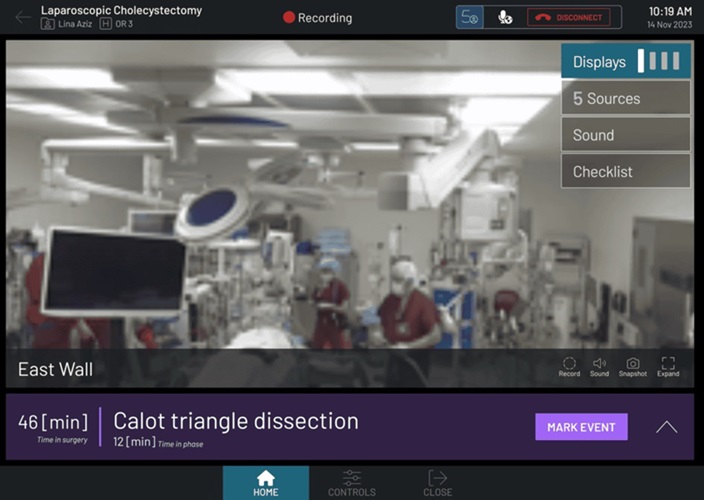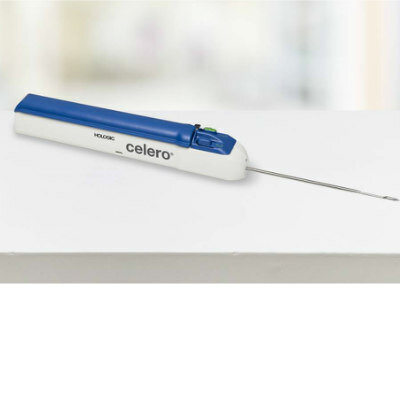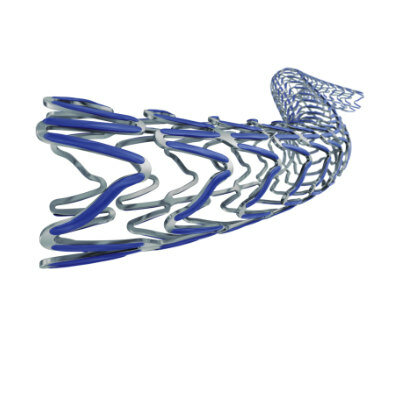AI-Powered Precision Surgery Platform to Make Procedures Smarter and Safer
|
By HospiMedica International staff writers Posted on 10 Sep 2024 |

The lack of seamless integration in medical technologies often results in inefficiencies, including unnecessary delays in surgery, increased potential for errors, and higher costs as equipment quickly becomes outdated. Hospitals are increasingly looking for solutions that prepare them for the future, enhancing the value of their technological investments and improving the efficiency of operating rooms (ORs). Now, a new, innovative precision surgery platform utilizes technology and artificial intelligence (AI) to gather, consolidate, and analyze diverse and detailed data, offering real-time and long-term clinical decision support to improve patient care, and operational efficiency.
Developed by Caresyntax (San Francisco, CA, USA), this enterprise-grade surgical intelligence system is vendor-neutral and incorporates proprietary software, hardware, and advanced AI technologies. It is designed to process and analyze a broad array of data across the surgical process, including electronic medical records (EMR), video, audio, images, data from medical devices, as well as financial and outcomes data along with clinical and operational metrics. This comprehensive approach allows for full visualization of the surgical pathway, offering insights that span from pre-procedure planning and surgical workflow optimization to intraoperative support and postoperative safety enhancements.
Caresyntax’s software and AI platform are adept at capturing and analyzing extensive volumes of video, audio, images, and data from devices, both clinical and operational, within and around the OR. Its automation platform can be actively used by the surgical team during procedures and accessed remotely via secure cloud storage and telehealth connections by personnel outside the OR. By providing detailed metadata insights and real-world evidence (RWE), the Caresyntax platform assists surgeons and their teams in enhancing patient care, enables hospital administrators to manage resources more effectively, and supports medical device companies in developing their products. Globally, Caresyntax is assisting over 30,000 surgical professionals in more than 3,000 operating rooms, leveraging automation and delivering actionable insights to hospitals, medical device firms, and insurance providers.
“Together with our partners and investors, we are working towards deploying precision surgical tools, empowered by data and AI, to improve patient outcomes,” said Dennis Kogan, Co-Founder and CEO of Caresyntax.
Related Links:
Caresyntax
Latest Surgical Techniques News
- New Transcatheter Valve Found Safe and Effective for Treating Aortic Regurgitation
- Minimally Invasive Valve Repair Reduces Hospitalizations in Severe Tricuspid Regurgitation Patients
- Tiny Robotic Tools Powered by Magnetic Fields to Enable Minimally Invasive Brain Surgery
- Magnetic Tweezers Make Robotic Surgery Safer and More Precise
- AI-Powered Surgical Planning Tool Improves Pre-Op Planning
- Novel Sensing System Restores Missing Sense of Touch in Minimally Invasive Surgery
- Headset-Based AR Navigation System Improves EVD Placement
- Higher Electrode Density Improves Epilepsy Surgery by Pinpointing Where Seizures Begin
- Open-Source Tool Optimizes Placement of Visual Brain Implants
- Easy-To-Apply Gel Could Prevent Formation of Post-Surgical Abdominal Adhesions
- Groundbreaking Leadless Pacemaker to Prevent Invasive Surgeries for Children
- Spectroscopy Technique Improves Surgery for Pediatric Epilepsy Patients
- Bioengineered Arteries Show Promise for Cardiovascular Surgery
- Online Tool Guides Surgical Decisions for Gallbladder Cancer
- Innovative Technology Enables Rapid Life-Saving Surgical Leak Detection
- First-Of-Its-Kind Bioresorbable Implant to Help Children with Rare Respiratory Disease
Channels
Critical Care
view channel
Mass Manufactured Nanoparticles to Deliver Cancer Drugs Directly to Tumors
Polymer-coated nanoparticles loaded with therapeutic drugs hold significant potential for treating cancers, including ovarian cancer. These particles can be precisely directed to tumors, delivering their... Read more
World’s Smallest Pacemaker Fits Inside Syringe Tip
After heart surgery, many patients require temporary pacemakers either to regulate the heart rate while waiting for a permanent pacemaker or to support normal heart rhythm during recovery.... Read more
AI-Powered, Internet-Connected Medical Devices to Revolutionize Healthcare, Finds Study
A new study suggests that artificial intelligence (AI)-powered, internet-connected medical devices have the potential to transform healthcare by enabling earlier detection of diseases, real-time patient... Read morePatient Care
view channel
Portable Biosensor Platform to Reduce Hospital-Acquired Infections
Approximately 4 million patients in the European Union acquire healthcare-associated infections (HAIs) or nosocomial infections each year, with around 37,000 deaths directly resulting from these infections,... Read moreFirst-Of-Its-Kind Portable Germicidal Light Technology Disinfects High-Touch Clinical Surfaces in Seconds
Reducing healthcare-acquired infections (HAIs) remains a pressing issue within global healthcare systems. In the United States alone, 1.7 million patients contract HAIs annually, leading to approximately... Read more
Surgical Capacity Optimization Solution Helps Hospitals Boost OR Utilization
An innovative solution has the capability to transform surgical capacity utilization by targeting the root cause of surgical block time inefficiencies. Fujitsu Limited’s (Tokyo, Japan) Surgical Capacity... Read more
Game-Changing Innovation in Surgical Instrument Sterilization Significantly Improves OR Throughput
A groundbreaking innovation enables hospitals to significantly improve instrument processing time and throughput in operating rooms (ORs) and sterile processing departments. Turbett Surgical, Inc.... Read moreHealth IT
view channel
Printable Molecule-Selective Nanoparticles Enable Mass Production of Wearable Biosensors
The future of medicine is likely to focus on the personalization of healthcare—understanding exactly what an individual requires and delivering the appropriate combination of nutrients, metabolites, and... Read more
Smartwatches Could Detect Congestive Heart Failure
Diagnosing congestive heart failure (CHF) typically requires expensive and time-consuming imaging techniques like echocardiography, also known as cardiac ultrasound. Previously, detecting CHF by analyzing... Read morePoint of Care
view channel
Handheld, Sound-Based Diagnostic System Delivers Bedside Blood Test Results in An Hour
Patients who go to a doctor for a blood test often have to contend with a needle and syringe, followed by a long wait—sometimes hours or even days—for lab results. Scientists have been working hard to... Read moreBusiness
view channel
Expanded Collaboration to Transform OR Technology Through AI and Automation
The expansion of an existing collaboration between three leading companies aims to develop artificial intelligence (AI)-driven solutions for smart operating rooms with sophisticated monitoring and automation.... Read more

















